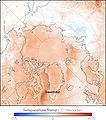This is an old revision of this page, as edited by NewsAndEventsGuy (talk | contribs) at 20:28, 28 April 2014 (Undid revision 606230076 by Prokaryotes (talk) It refers to WARMING and does NOT refer to "Climate changes".... your discussion is still underway and you haven't obtained consensus for this). The present address (URL) is a permanent link to this revision, which may differ significantly from the current revision.
Revision as of 20:28, 28 April 2014 by NewsAndEventsGuy (talk | contribs) (Undid revision 606230076 by Prokaryotes (talk) It refers to WARMING and does NOT refer to "Climate changes".... your discussion is still underway and you haven't obtained consensus for this)(diff) ← Previous revision | Latest revision (diff) | Newer revision → (diff)Polar amplification can refer to amplifying changes in the climate system at the Earth's poles, in response to global warming. Arctic amplification, relates to northern hemispheric changes, and Antarctic amplifaction to amplifying changes at the south pole. Amplifying mechanisms can include, the reduction of snow cover and sea ice, changes in atmospheric and ocean circulation, the presence of anthropogenic soot in the Arctic environment, increases in cloud cover and water vapor. Most studies connect sea ice changes to polar amplification.
Arctic amplification
Main article: Climate change in the ArcticArctic amplification, may refer to a greater temperature increase in the Arctic compared to the Earth as a whole as a result of the effect of feedbacks and other processes. It is common to see it stated that "Climate models generally predict amplified warming in polar regions", e.g. Doran et al.
Arctic amplification has been linked to extreme weather in mid-latitudes.
Antarctic amplification
Observation of air temperature only show a slight warming in Antarctica. CMIP5 modeling projects a decrease in sea ice cover in Antarctica. However, satellite observations show a slight increase in sea ice at the south pole.
See also
References
- "IPCC AR5 - Near-term Climate Change: Projections and Predictability (Chapter 11 / page 983 )" (PDF). 2013.
{{cite journal}}: Cite journal requires|journal=(help) - Arctic Climate Impact Assessment - International Arctic Science Committee
- Doran, Peter T.; Priscu, John C.; Lyons, W. Berry; Walsh, John E.; Fountain, Andrew G.; McKnight, Diane M.; Moorhead, DL; Virginia, RA; et al. (31 January 2002). "Antarctic climate cooling and terrestrial ecosystem response". Nature. 415 (6871): 517–20. doi:10.1038/nature710. PMID 11793010.
- Evidence linking Arctic amplification to extreme weather in mid-latitudes 17 March 2012 Geophysical Research Letters doi:10.1029/2012GL051000
- "Antarctic cooling, global warming?". RealClimate. 3 December 2004.
- "IPCC AR5 - Near-term Climate Change: Projections and Predictability (Chapter 11 / page 996)" (PDF). 2013.
{{cite journal}}: Cite journal requires|journal=(help)
| Climate oscillations | |
|---|---|
| Climate oscillations |
|

